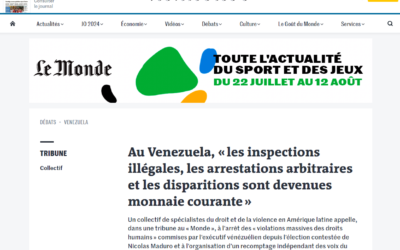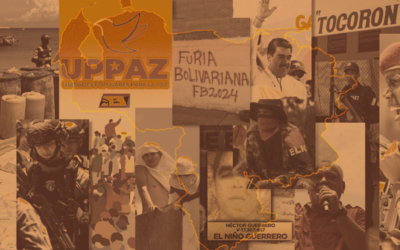September 3, 2018
Keymer Ávila | @Keymer_Avila
A few weeks ago PROVEA presented its 2017 Annual Report , whose chapter on the Right to Personal Liberty was under our responsibility. Below we will highlight the most important aspects of it:
During the period analyzed, a total of 2,902 alleged violations of the right to personal liberty were registered, which represents a decrease of 59% compared to the figure for 2016 . However, the general trend is still towards an increase in these cases . It is noteworthy that at least 88% of these arrests (some 2,553) are linked to the demonstrations that occurred between April and July 2017 .

Source: PROVEA Annual Report 2017
The indicated decrease in the total figures was due to the significant decrease in the number of people detained en masse during 2017. PROVEA registered a total of approximately 2,477 people detained en masse, which constitutes 85.4% of the total number of alleged violations. to personal freedom during this year. In 2017, institutional violence continued to be focused mainly on street demonstrations, with more intensity than the previous year. This explains the decrease (by 99%), among others, of mass arrests in contexts of militarized police operations, which during the year under analysis was barely 0.7% of mass arrests; as well as 1.17% of the total registered illegal or arbitrary detentions. Similarly to 2016, these massive arrests are being replaced by more intense, selective and deadly institutional interventions. This means that in popular neighborhoods, victimization by police action maintains its lethality. According to official figures,26% of the homicides in the country are a consequence of the direct intervention of the security forces of the State .
Collective arrests increased by 54.3% compared to the previous year, and 126.5% over the general average of the last 9 years. Likewise, there is a 191% increase in arrests that occurred in the context of demonstrations compared to the previous year, and 308.3% over the general average of the last 28 years. The year under study is the second with the highest figures for this type of arrests, surpassed only by those of 2014.

Source: PROVEA Annual Report 2017
In 2017, some 318 people suffered violations of their personal integrity in the context of these arrests, which represents an increase of 90% compared to the previous year. This is another example of the progressive intensification of institutional violence.
The majority profile of the victims that could be identified is the following: male (88%), with an average age of 26 years, student (28.3%), military (22.8%) or foreigner (16.4% ).
Regarding persons deprived of liberty for political reasons, 51 cases and 192 victims were registered, which represents an increase of 464.7% compared to 2016, in which only 34 victims were reported. The year 2017 appears as the period with the most cases of this type, at least during the last 9 years in which PROVEA has followed up on them. If compared with the previous counts that have been carried out since 2009, this increase is 337.4% compared to the general average of arrests of this nature, which have a clear upward trend. 50.5% of these cases were carried out en masse, 33.9% collectively and only 15.6% individually. These figures could be an additional indicator of these arrests: they are becoming more and more massive and indiscriminate.

Source: PROVEA Annual Report 2017
The month that reported the highest number of cases was May with 50%, followed by June with 19.3% and July with 14.1%. During these 3 months, 89% of the arrests occurred for political reasons, a period that also coincides with the month after the start of the demonstrations, the political and street conflict in the country.
Thus, for example, in the month of May the arrest of some 85 FANB officers was denounced, which could be an indicator of the malaise that could be brewing inside this institution. The military represented 51% of those detained for political reasons registered in 2017 .
Similarly to 2016, the states that presented the highest number of illegal or arbitrary detentions were: Carabobo with 727 (25.1%), Aragua with 446 (15.4%), Miranda with 343 (11.8%), Lara with 312 (10.8%), the Capital District with 225 (7.8%), Zulia with 205 (7.1%) and Bolívar with 201 (2.2%), these 7 states accumulate 86.1% of all registered cases.
Forced disappearances had a 68% decrease compared to the previous year (which presented a very high figure, 19 people), as well as a 46% decrease compared to the average systematized by PROVEA during the last 18 years.
Finally, the number of violations of the rights of prisoners, recorded in cells and police checkpoints, reached some 45,000 people affected, a figure that could not be compared with that of previous years since it refers to a total census of the population detained at police checkpoints, who suffer from overcrowding and precarious prison conditions. Of these, it was possible to characterize the situation of approximately 522 victims, 70.7% less than the cases analyzed last year, and 48% less than the average of the last 7 years systematized by PROVEA. This could mean, on the one hand, greater opacity regarding this type of data; From another perspective, it could also be interpreted as a decrease in media interest in this problem, since the few official and unofficial figures point to a clear increase in incarceration rates, both in prisons and in police checkpoints.
The previous comment serves to warn that the main source of this analysis was the media, both print (national and regional) and digital, which constitute the most stable source of information on these phenomena, since detailed official sources are scarce. and sometimes non-existent. However, in cases where official information existed, it was prioritized before any other source. Among the official information, public statements by authorities, communiqués, messages on social networks and annual management reports stand out. Direct complaints received at PROVEA offices are also included in this report.
The complete chapter can be consulted at this link: https://www.academia.edu/37184212/Derecho_a_la_Libertad_Personal_en_Venezuela_2017 ; https://provea.org/wp-content/uploads/2018/06/16libertad_personal-3.pdf
PS: I want to thank Thais López for the support in the systematization of the information for the elaboration of the aforementioned report.
Publicado originalmente en Provea.












